Foreign homebuyers are back in the Dominican Republic
When the Dominican Republic reopened its borders and suspended most of its pandemic-related restrictive measures, foreign buyers and international investors quickly returned. Sales to locals increased dramatically in recent months, too.
“Investors and people who could afford second homes here were buying like crazy,” said Melquis Segura of Santo Domingo-based property firm ApartamentosRD. This statement is backed by Sergio Llach, the chief executive of Dominican Republic Sotheby’s International Realty, who claims that the housing market is accelerating due to pent-up demand and foreign buyers are flooding in to the country.
Before the pandemic, the Dominican Republic’s residential property market has been growing rapidly, thanks to robust tourism growth and the arrival of luxury international and boutique hotels, coupled with strong economic fundamentals.
“Tourists come for the surfing and the windsurfing, and many of them end up buying homes here too,” says Josefina Covents of the Cabarete-based agency Josefina Covents y Asoc. This is also supported by Llach, who noted that many of the homebuyers were regular visitors to the country. “The people who buy in the Dominican Republic have been here at least 10 times before,” Llach said. “They’re confident in what they want.”
There are no restrictions on foreigners’ buying property.
Aside from its reputation as a tax haven and long stretches of sandy white beaches and a balmy temperature, foreign homebuyers are attracted because property is still a bargain, relative to the rest of the Caribbean. A newly-built one-bedroom apartment near a beach can be bought for just US$150,000 or less.
Foreign property investment is also encouraged by incentives, which according to the country’s tourism office, include:
- Tax-free receipt of pension income from foreign sources, including moving belongings to the country, is guaranteed (Law 171-07 on Special Incentives for Pensioners and Persons of Independent Means).
- Foreign buyers receive a 50% exemption from property tax
- Exemption from taxes on dividends and interest income, generated within the country or overseas
- Foreign buyers receive a 50% exemption from taxes on mortgages, when the creditors are financial institutions regulated by Dominican financial monetary law
- Exemption from payment of taxes for household and personal items
- Exemption from taxes on property transfers
- Partial exemption on vehicle taxes
- Developers are relieved of all national and municipal taxes for ten years, including the tax on the transfer of ownership to the first purchaser of a property, by Law 158-01 on Tourism Incentive.
“Over the past five years, an expanding tourism industry, a stable economy and friendly tax laws have brought a wave of international buyers to this Caribbean nation of about 11 million residents,” said Sydney Franklin of The New York Times.
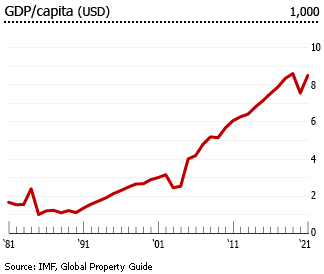
However, the Dominican Republic is not your usual Caribbean fantasy ‘unspoiled virgin island paradise’. It has almost 11 million people spread over a mountainous 48,072 sq km, and the social problems include a vast gap between rich and poor, and the highest possibility in the world of death from handguns, though the situation has improved dramatically over the past decade.
There has been an amazing increase in wealth, with the country’s average per capita GDP increasing by more than three times from just US$2,460 in 2003 to US$8,500 in 2021, according to the International Monetary Fund (IMF). Moreover, the national poverty rate dropped sharply to 21% in 2019 from more than 40% a decade ago. However, the poverty rate increased to 23.9% in 2021 due to the adverse impact of the Covid-19 pandemic, according to the World Bank.
Also, it has great attractions for the adventurous traveler. “There’s the natural beauty of the landscape. The country is very green, different shades of green,” says Monique Frings of Dominican-realty.com. “It has the highest mountain in the Caribbean and a small salt water lake. There are miles and miles of beaches and nobody comes. It is still very open.”
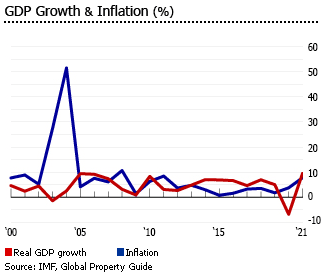
The Dominican Republic offers good rental yields, with some areas registering net rental yields as high as 10% annually, according to some local real estate experts.
Foreigners are further encouraged by a strong economy, stable government, an improving infrastructure, and easy access via its three international airports. In 2021, the economy grew strongly by 12.3% from a year earlier, according to the World Bank, fully offsetting the 6.7% contraction seen in 2020. Before the pandemic, the Dominican Republic has been growing by an annual average of 5.3% in 2000 to 2019
Foreign investors pushing property prices up
The surge in foreign property investors has been pushing prices up by an average of 10% every year since the global crisis, according to local real estate experts. In fact, the Covid-19 pandemic did little to slow the housing market. Currently, prices for residential properties with an ocean view typically start at about US$120,000 while beachfront properties start as low as US$150,000.
Recently, the Dominican Republic is moving beyond the retiree market and becoming a more desirable destination for families.
“They’re not here for the ‘starter’ international investment. Instead, they’re paying US$350,000 to US$600,000 for a big house with a nice yard,” said Cheryl Henderson of Keller Williams Dominican Republic.
At the high-end market, prices of luxury homes, which typically have an asking price of at least US$5 million, are stable, but in some areas, these prices are also rising robustly.
The volume of luxury property transactions has been rising strongly since the country reopened and economic activity has returned to pre-pandemic levels, according to local property experts.
The Caribbean’s top tourist draw
The Dominican Republic has been the top vacation destination in the Caribbean since 2005, by a considerable margin, according to the World Bank.
- During the financial crisis of 2008-2009, the country’s tourism sector remained stable, with around 3.98 million and 3.99 million stay-over tourist arrivals, respectively, based on figures from the Caribbean Tourism Organization.
- By 2016, non-resident stay-over tourists had increased to almost 6 million, while cruise arrivals surged to 809,286 people. In 2017, tourism continued to grow, despite hurricanes Irma and Maria. Non-resident stay-over tourists rose by 3.8% y-o-y in 2017, while cruise arrivals soared 36.9%.
- In 2018, non-resident stay-over tourist arrivals rose by 6.2% to 6.57 million people from a year earlier. Cruise arrivals fell by 11.3% y-o-y to 982,319 people, but still more than twice as much compared to a decade ago.
- In 2019, non-resident stay-over tourist arrivals fell slightly by 1.9% y-o-y to 6.45 million people while cruise arrivals increased 12.4% to 1.1 million.
The tourism industry contributes about 15% of the country’s GDP.
However the past two years have been an exception, with tourist arrivals in the whole Caribbean region almost grinding to halt after the imposition of travel restrictions and lockdown measures worldwide. Dominican Republic closed its borders during the onset of the Covid-19 outbreak, in an effort to prevent the spread of the virus to the country.
In 2020, non-resident stay-over tourist arrivals plunged 63% y-o-y to 2.4 million people and cruise arrivals dropped 69% to just about 343,000, according to the Banco Central Republica Dominica.
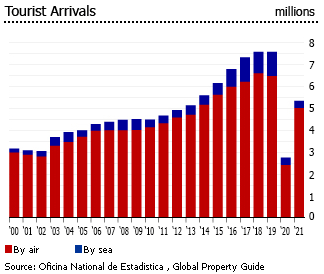
To revive the industry, the government announced a tourism recovery plan, with measures to ensure the health and safety of both visitors and locals, including medical insurance and random breath tests on passengers.
In 2021, non-resident stay-over tourist arrivals more than doubled from the prior year, to almost 5 million people – more than any other country in the Caribbean - yet still below the annual average of 6.3 million air arrivals in 2016 to 2019.
The Dominican Republic’s pandemic story is a rare success, including not requiring a Covid test or proof of vaccination for most incoming travelers. Instead, the government has managed infection cases by promoting vaccination and mask-wearing among those who interact with tourists. Almost 100% of the 174,000 workforce in the tourism sector are vaccinated, according to the Minister for Tourism.
Foreign buyers love the coast
Tourist developments are concentrated in the east and north. Southern areas such as Barahona and Pedernales are less developed and less visited, but there have been efforts to promote them as eco-tourism destinations.
Punta Cana is the most popular tourist destination. Punta Cana’s international airport, situated in the country’s popular eastern region, receives around 65% of all tourists traveling to the country every year.
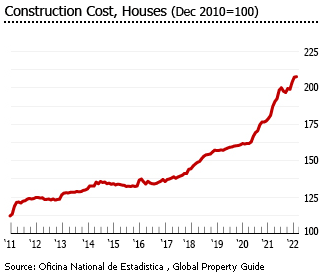
Some of the most desirable residential areas are in tourist hot spots such as the capital, Santo Domingo, and the areas on the country’s beautiful Atlantic coast, such as the tourist towns of Sosua and Cabarete, the peninsula of Samaná, and Puerto Plata. Luxury beachfront apartments in places such as Punta Cana and Bavaro, Las Terrenas and Boca Chica have been built in recent years.
One of the most high-profile developments has been the Cap Cana project on the east coast, a high-end residential and tourist mixed development of hotels, oceanfront homes, golf courses and commercial establishments.
What is on offer
The Dominican Republic’s property market is very diverse. Prices at the lower end of the luxury market range from around US$100 to US$420 per square foot (sq. ft) for a prime oceanfront home, according to ReMax’s Premal Parekh. However high-end residential property prices can go as high as US$5 million in the north and US$9 million in the south. The highest-priced home in the Dominican Republic is listed for US$25 million, Parekh added.
In Santo Domingo, the country’s capital and largest city, the average price of a two- or three-bedroom house in the city center stands at around US$150,000. In Casa de Campo, a luxury gated community in La Romana, about an hour east of Santo Domingo, villa prices range from US$300,000 to over US$6 million depending on the property’s size, age, and proximity to the ocean, according to a 2021 article by The New York Times.
In Puerto Plata, on the north coast, apartment prices have been rising by double-digit figures. Bigger apartments have showed the highest price appreciation. A 200 square metre (sq. m) apartment in upscale neighborhoods of Puerto Plata, like Sosua, costs around US$2,400 per sq. m.
In the Cabarete area, the price of an older two- or three-bedroom condominium farther from the water starts at about US$200,000, while oceanfront homes in newer luxury developments, like Sea Horse Ranch, sell for at least US$700,000, said William Holden of Holden Sotheby’s International Realty.

Several new oceanfront luxury condominium developments have been built in the past several years, with unit prices ranging from US$500,000 to US$2 million.
In other beachside destinations such as Sosúa, Las Terrenas and Punta Cana, growing interest from foreign investors has led to a residential construction boom. According to Cheryl Henderson of Keller Williams Dominican Republic, at least 90 projects are underway in the area, ranging from oceanfront villas in resort communities to condominium buildings and golf course-adjacent single-family homes.
The construction of major hospitality projects like Cap Cana, the Moon Palace Resort in Punta Cana, and San Souci Port in Santo Domingo are also expected to boost tourism, as well as the real estate market.
The US$220 million St. Regis Cap Cana Resort & Residences broke ground in October 2020. It will feature 200 guestrooms and suites and 67 residence, iconic St. Regis butler service, bespoke amenities, and a world-class 8-hole golf course designed by Jack Nicklaus. It is slated to open in 2023.
Other tourism-related developments include Amber Cove, the luxurious Carnival Cruise Lines port-and-tourist village at Maimon, located just west of Puerto Plata, which opened in October 2015. Royal Caribbean is also planning to open a new port near Playa Dorada, between Puerto Plata and Sosua.
Though the Dominican Republic has its own currency, the peso, most real estate listings and transactions, especially of high-end properties, are quoted in U.S. dollars.
Residential construction costs continue to rise strongly
In February 2022, construction costs for houses soared 14.7% from a year earlier, after annual rises of 15% in 2021, 10.2% in 2020, 2.4% in 2019, 9.1% in 2018, 5.1% in 2017, and 3.4% in 2016, according to the Oficina National de Estadistica.
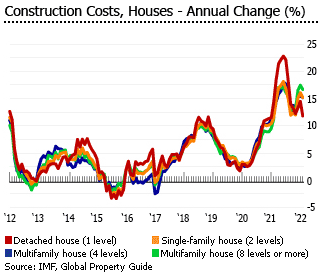
By property type:
- Detached houses (one level): construction costs rose by 11.8% y-o-y in February 2022, following annual rises of 13.3% in 2021 and 11.3% in 2020
- Single-family houses (two levels): construction costs surged 15.2%, after y-o-y increases of 15.1% in 2021 and 10.1% in 2020
- Multi-family houses (four levels): construction costs rose strongly by 16.7%, after y-o-y increases of 16.5% in 2021 and 8.9% in 2020
- Multi-family houses (eight levels or more): construction costs increased 15.1%, following y-o-y rises of 15.2% in 2021 and 10.4% in 2020
Shortage of affordable housing
The construction sector accounted for more than 7% of the country’s GDP in recent years. The number of permits for construction of apartments rose by 24.5% in 2021, following a decline of 21.3% in 2020 due to pandemic-related restrictions, according to the Oficina National de Estadistica. Likewise, permits granted for housing construction also rose by 21.3% last year, after falling by 40.4% in 2020.
However, most residential construction is aimed at the high-end market.
The low-end market has an acute shortage of accommodation, and the country has a housing deficiency of more than 1 million homes.
Frequent hurricanes and flooding have exacerbated the shortage. Economic damage from natural disasters in the Dominican Republic costs around US$420 million a year, according to a recent study conducted by World Bank and the Ministry of Economy, Planning and Development. For instance in September 2017 alone, two strong hurricanes, Hurricane Irma and Hurricane Maria, devastated a large number of houses, particularly those built of low-quality materials near the sea.
Last year, President Luis Abinader launched the “Happy Family National Housing Plan (PNVFF)” to build 62,000 homes in four years in a public-private partnership that will benefit 310,ooo people and create almost 460,00 direct and indirect jobs. The initiative will have an initial investment from the government amounting to US$32 million, which will increase to US$200 million at the last year of the project.
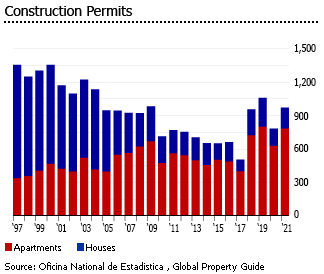
In the first phase, 11,000 apartments will be built in various locations, including Los Alcarrizos, Azua, Santo Domingo East, Higüey, Santo Domingo West, Sabana Perdida, La Romana, Pedro Brand, and San Pedro de Macorís.
Around 80% of all homes in the Dominican Republic are detached houses.
Mortgage rates remain high amidst rising key rates
In April 2022, Banco Central Republica Dominica raised its benchmark interest rate by 50 basis points to 5.5%, its fourth consecutive rate hike since December 2021 in a bid to rein in inflationary pressures and protect the domestic currency.
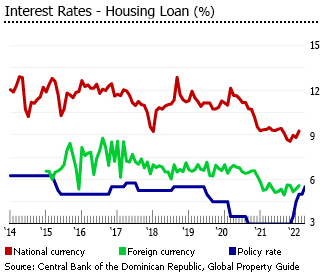
The central bank also raised the deposit and lending rates by 50 basis points each to 5% and 6%, respectively.
As such, average interest rates on housing loans remains high.
- National currency-denominated housing loans: the average interest rate was 9.26% in February 2022, slightly down from 9.34% a year earlier and 10.99% two years ago.
- Foreign currency-denominated housing loans: the average interest rate was 5.58% in February 2022, up from 5.26% in February 2021 but down from 6.4% two years ago.
Developing the mortgage market
Most property transactions in the Dominican Republic are done in cash. The country’s mortgage market was equivalent to just 5.1% of GDP in 2021, even though housing loans grew by almost 17% per year from 2000 to 2021.
More mortgages have been offered by local banks since 2012’s Law on Mortgage Market Development and Trusts provided tax incentives and established the Trust as a legal instrument. As a result, mortgages with a loan-to-value ratio of 70% of the appraised value of the property are offered.
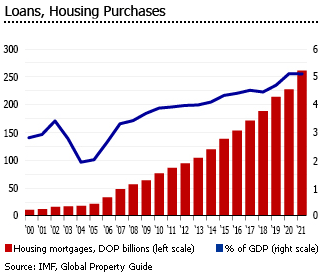
In March 2022, the total value of loans for house purchases was DOP 271.52 billion (US$4.89 billion), up by 16.2% from a year earlier and about 24.5 times the amount in 2000, according to the Banco Central Republica Dominica.
Strong economic growth
In 2021, the economy grew strongly by 12.3% from a year earlier, according to the World Bank, fully offsetting the 6.7% contraction seen in 2020 during the onset of the Covid-19 pandemic. According to the World Bank, the strong rebound was “supported by a solid policy response to COVID-19, including fiscal, macroprudential and supervisory policies, and monetary easing.”
Before the pandemic, the Dominican Republic had been growing robustly, with an annual average GDP growth of 5.3% in 2000 to 2019.
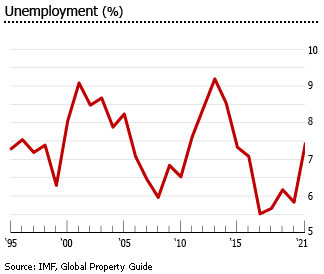
“Tourism, remittances, foreign direct investment, mining revenues, free-trade zones, and telecommunications have helped make the DR the second fastest growing economy in LAC over the last decade, and as of 2019 the country was on track to realize its ambition of achieving high-income status by 2030,” said the World Bank.
Unemployment was estimated at 7.4% in 2021, slightly up from an annual average of 7.1% in 2010 to 2020. The jobless rate is expected to fall to 6.6% this year, according to the International Monetary Fund (IMF).
Inflation stood at 9.1% in March 2022, the highest level since June 2021, according to the Banco Central Republica Dominica.
Sources:
- Index of Direct Costs of Home Construction (ICDV) (National Statistics Office): https://www.one.gob.do/precios-y-costos/icdv
- Tourism (National Statistics Office): https://www.one.gob.do/datos-y-estadisticas/temas/estadisticas-economicas/estadisticas-sectoriales/turismo/
- Tourism Sector (Central Bank of the Dominican Republic): https://www.bancentral.gov.do/a/d/2537-sector-turismo
- Construction and real estate activities (National Statistics Office): https://www.one.gob.do/datos-y-estadisticas/temas/estadisticas-economicas/estadisticas-sectoriales/construccion-y-actividades-inmobiliarias/
- Buying a House in the Dominican Republic (7th Heaven Properties): https://www.7thheavenproperties.com/2020/01/buying-a-house-in-dominican-republic/
- The Dominican Republic announces tourism recovery plan centered on health safety (Travel Daily News): https://www.traveldailynews.com/post/the-dominican-republic-announces-tourism-recovery-plan-centered-on-health-safety
- Why Is Everyone Going to the Dominican Republic? (The New York Times): https://www.nytimes.com/2022/01/27/travel/dominican-republic-tourism-pandemic.html
- Tourists Flock to Dominican Republic in Record-Breaking Numbers (Travel Pulse): https://www.travelpulse.com/news/destinations/tourists-flock-to-dominican-republic-in-record-breaking-numbers.html
- Dominican Republic Keeps Eclipsing Pre-Pandemic Tourism Levels (Caribbean Journal): https://www.caribjournal.com/2022/03/03/dominican-republic-tourism-pre-pandemic/
- Monetary and Financial Sector (Central Bank of the Dominican Republic): https://www.bancentral.gov.do/a/d/2536-sector-monetario-y-financiero
- Dominican government launches plan to build 62,000 homes in 4 years (Dominican Today): https://dominicantoday.com/dr/local/2021/04/18/dominican-government-launches-plan-to-build-62000-homes-in-4-years/
- The World Bank in Dominican Republic (World Bank): https://www.worldbank.org/en/country/dominicanrepublic/overview#1
- Prices (Central Bank of the Dominican Republic): https://www.bancentral.gov.do/a/d/2534-precios
- House Hunting in the Dominican Republic: A Tropical Compound for $2.5 Million (The New York Times): https://www.nytimes.com/2021/02/24/realestate/house-hunting-in-dominican-republic.html
- The State of Dominican Republic Real Estate (Caribbean Journal): https://www.caribjournal.com/2020/08/11/dominican-republic-real-estate-market/
- Real Sector (Central Bank of the Dominican Republic): https://www.bancentral.gov.do/a/d/2533-sector-real
- Construction on the Rise in Dominican Republic with Groundbreaking of St. Regis Cap Cana Resort & Residences (Global Newswire): https://www.globenewswire.com/news-release/2020/10/22/2113181/0/en/Construction-on-the-Rise-in-Dominican-Republic-with-Groundbreaking-of-St-Regis-Cap-Cana-Resort-Residences.html